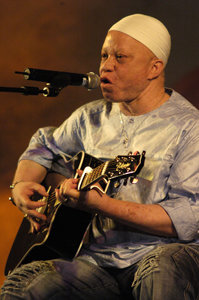| B i o g r a p h y |
 Salif Keïta
(born August 25, 1949) is an internationally recognized afro-pop
singer-songwriter from Mali. He is unique not only because of his
reputation as the Golden Voice of Africa, but because he has
albinism and is a direct descendant of the founder of the Mali
Empire, Sundiata Keita. This royal heritage meant that under the Malian
caste system, he should never have become a singer, which was deemed to
be a griot’s role. Keita was born in the city of Djoliba. He was cast
out by his family and ostracized by the community because of his
albinism, a sign of bad luck in Mandinka culture.[1] He left Djoliba
for Bamako in 1967, where he joined the government sponsored Super Rail
Band de Bamako. In 1973 Keita joined the group, Les Ambassadeurs. Keita
and Les Ambassadeurs fled political unrest in Mali during the mid-1970s
for Abidjan, Côte d'Ivoire and subsequently changed the group's name to
Les Ambassadeurs Internationaux. The reputation of Les Ambassadeurs
Internationaux rose to the international level in the 1970s and in 1977
Keita received a National Order award from the president of Guinea,
Sékou Touré.
Salif Keïta
(born August 25, 1949) is an internationally recognized afro-pop
singer-songwriter from Mali. He is unique not only because of his
reputation as the Golden Voice of Africa, but because he has
albinism and is a direct descendant of the founder of the Mali
Empire, Sundiata Keita. This royal heritage meant that under the Malian
caste system, he should never have become a singer, which was deemed to
be a griot’s role. Keita was born in the city of Djoliba. He was cast
out by his family and ostracized by the community because of his
albinism, a sign of bad luck in Mandinka culture.[1] He left Djoliba
for Bamako in 1967, where he joined the government sponsored Super Rail
Band de Bamako. In 1973 Keita joined the group, Les Ambassadeurs. Keita
and Les Ambassadeurs fled political unrest in Mali during the mid-1970s
for Abidjan, Côte d'Ivoire and subsequently changed the group's name to
Les Ambassadeurs Internationaux. The reputation of Les Ambassadeurs
Internationaux rose to the international level in the 1970s and in 1977
Keita received a National Order award from the president of Guinea,
Sékou Touré.
Keita moved to Paris in 1984 to reach a larger audience. His music combines traditional West African music styles with influences from both Europe and the Americas, while maintaining an overall Islamic style. Musical instruments that are commonly featured in Keita's work include balafons, djembes, guitars, koras, organs, saxophones, and synthesizers. Keita found success in Europe as one of the African stars of world music, but his work was sometimes criticised for the gloss of its production and for the occasional haphazard quality. However, shortly after the turn of the Millennium he returned to Bamako in Mali to live and record. His first work after going home, 2002's Moffou, was hailed as his best album in many years, and Keita was inspired to build a recording studio in Bamako, which he used for his album, M'Bemba, released in October 2005. Keita's latest album, La Différence, was produced around the year end of 2009. The work is dedicated to the struggle of the world albino community (victims of human sacrifice), for which Keita has been crusading all his life. In one of the album's tracks, the singer calls others to understand that "difference" does not mean "bad" and to show love and compassion towards albinos like everyone else:"I am black/ my skin is white/ so I am white and my blood is black [albino]/... I love that because it is a difference that's beautiful..", "some of us are beautiful some are not/some are black some are white/all that difference was on purpose.. for us to complete each other/let everyone gets his love and dignity/the world will be beautiful."
La Différence is unique in that for the first time Keita has clearly and boldly combined different melodic influences to produce a highly original musical feel, with a wide range of appeal. The album was recorded between Bamako, Beirut, Paris, and Los Angeles. This unique musical feel is reinforced by soulful pitches in the track "Samigna" emanating from the trumpet of the Libanese great jazzman, Ibrahim Maaluf. La Difference won Keita one of the biggest musical awards of his career: the Best World Music 2010 at the Victoires de la musique.